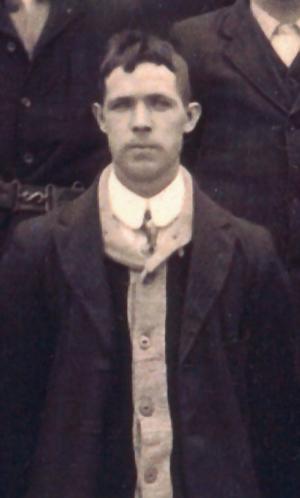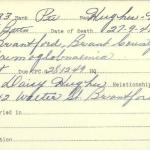BX December 7, 1915
How Brant Boys In the Trenches Break Monotony – Letter Received By Expositor Was Written With Battle Overhead – Graphic Description of Life on Firing Line – Danger is Always Near, But There is Plenty of Fun as Well as Hard Work – Antics of a Tumbler in Brantford Company of 19th Battalion
An interesting letter descriptive of life in the trenches has been received by The Expositor from Pte. H. Hughes, of C. Company, 19th Battalion now in Belgium. The letter was written in the front line trenches with the shells crashing about and a battle going overhead. In the letter, which is replete with graphic descriptions of their life, he tells how they break some of the monotony and also of the antics of a number in his company. The letter was written on November 19, it follows:
Knowing you are always anxious to publish news you get first hand from the Brantford boys, I will take the opportunity of sending you a line. Just at the time of writing there is a pretty lively scrap in the air and you may bet your boots that our boys are chasing “Mr. Baby Killer” over into his own lines. It is unbelievable how the German airmen scoot for safety when they see any boys after them; of course they put up a scrap at times, but invariably get the worst of it. We have had the pleasure of seeing three brought down, two in our own lines and one in the enemy’s line. Only yesterday morning, one fell in his own lines. We have had quite a few exciting times, especially when we are being shelled. I must remark here that I turned round and thought I saw a stranger, but it was Bill Thomas, late of the waterworks, he had just had a wash. These are things that must be remarked upon because we get so used to seeing each other plastered from head to foot in mud that it comes as a shock to see anyone with a clean face in the front line trench.
We have here with us one Bill Skinner, the champion tumbler of the second division, if there is a hole within a few yards of us; it seems to draw him towards it (I suppose that is because he has always worked in holes for the waterworks). All our boys are ready to wager anything that he will do more tumbles in a day and comes up smiling more than any man on the firing line. If there happens to be any tumblers who have not joined up here’s a chance for them to make some noise.
A friend of mine, Walter Hewson a trench observer, is just reporting on a new German sniping post. They are cunning dogs and it certainly is a beauty looking through the periscope. One would never notice it unless one had taken keen observation of the objects previously. That is the only way we all seem to want to go over seen and then keeping a sharp lookout for it and you may safely bet that Hewson is the boy right on the job. The officers complimented him on his smartness.
Things are not so black on the firing line as they are painted, of course it’s not a garden party, but it rests entirely with us whether we are comfortable or at leisure, so you can take it from me that we make things as lively as we can for ourselves. We have had a few very hard things to swallow and our day will come when we can give “the Baby Killers” payment for all our boys who have gone under. When a shell bursts in the trenches and gets any of the boys (which does not happen very often) we all seem to want to go over the parapets, but of course that would only be suicide so we just have to pile up the score against them. One thing is very noticeable, and all the older soldiers say the same, that is, every shell the Germans fire we give them four, so you see the tables are turned in that respect. The time was when we had to take four to one. We had the sight of our lines on November 17, we were on the march and about 200 yards to our right was a village of about 400 souls. We rested outside and at three p.m. the German long range guns started shelling it and to see the inhabitants come running down the road scared to death, was enough to make the heart bleed. All we could do was look on and grip our rifles a little tighter. Especially when a house went up in the air, but one redeeming feature of the bombardment was that more than half the shells did not burst and we heard afterwards that only one civilian was hurt, so it gained them nothing, if anything they just made the score a little heavier against themselves. Of course this is “war.” But when one sees little kids and women having to leave their homes on account of the Huns, it just makes men feel like killing everything German. Needless to say, it is only energy wasted, which we may need when we have the Huns in front of our bayonets, then we will remember these things and try our best to avenge our boys who have gone before.
Just at present we are having a little fun over our rations “Charlie Poynter” is in charge of our section of 12 men and he has only drawn enough for eleven men and we are just quietly crying. I say quietly advisedly because we dare not swear “ahem.” In fact we never have anything to swear over to straighten things out, but we always have enough and to spare. That is one good thing, no one could possibly growl about the food, of course a little mud gets in it at times, but that is eaten as an extra, as we are told to keep it quiet or everyone will want some.
This morning when we came out of our “dug out,” we found some lug footed scare brained idiot upset the “Rum Ration.” Say the air just turned blue and we swore someone had drunk it, but they did not make any more so we had to let it go at that, but we sent five rounds rapid fire at the German…. (Last line cut off) in the support trenches and they come to tell of a fatigue party, we try to get out of it of course (only in fun) and when they do get us we always say “what, again!” I was on fatigue last night and invariably the answer we get is “Yes” and “You’ll be on fatigue tomorrow night.” So you see the sympathy we get, but all these little things help to pass the time and make a break in the monotony in things.
As to shell and rifle fire one gets so used to that kind of thing that we take no notice, unless they shell the trenches. Our physical exercise comes in handy on the hands down. So tell the boys who are in training to do that part of it as it will stand them in very good stead when they get over here for their first day in the trenches. Our major and captain had a miraculous escape, a shell went right through the wall of their dug out and burst right between them, but thank God neither was seriously hurt, but were pretty badly shaken up. But that day we found out that our major and captain were made of the right stuff as about an hour afterwards they were showing us things the shells had knocked all to pieces. That goes to show that they can do their little bit when called upon.
Sergeant Speechley, our platoon sergeant is very popular with the boys and I might say he looks after our interests so far as lies in his power, and by the time we have to take any trenches all the boys will willingly follow him over the parapet. All the boys greatly (our champion tumbler has just had another drop) appreciate the socks and other comforts sent from time to time by the people of Brantford. The boys of six section especially, as we are all wearing the socks at present and they are the real goods. All the boys in the trenches send an appeal to the fellows who are hanging back to join up – “The more the merrier” – and let us get the job finished. Just tell them that the Huns love Canucks like the devil does Holy water. Hoping my effort at letter writing will interest you. I conclude and remain.
Sincerely yours,
Private H. Hughes
P.S. – After finishing my letter our artillery commenced to shell the German trenches, trying to locate some new German works. One of the shells exploded rather high and a piece of the shrapnel flew back into our trenches and struck Sergt. Speechley in the throat just breaking the skin but did not hurt him any and we are all very pleased that the foul of it was pretty well spent, but he had to pull it off his neck. So that’s how these little things occur.
The following is a list of names of six section: Capt. Bacon, Ptes., C.R. Poynter, G. Skinner, W. Thomas, W. Sweeney, W. Hewson, R. Charlick, A. Riley, E.S. Taylor, H. Hughes, Bugler Bell, C. Company, 19th Battalion.


